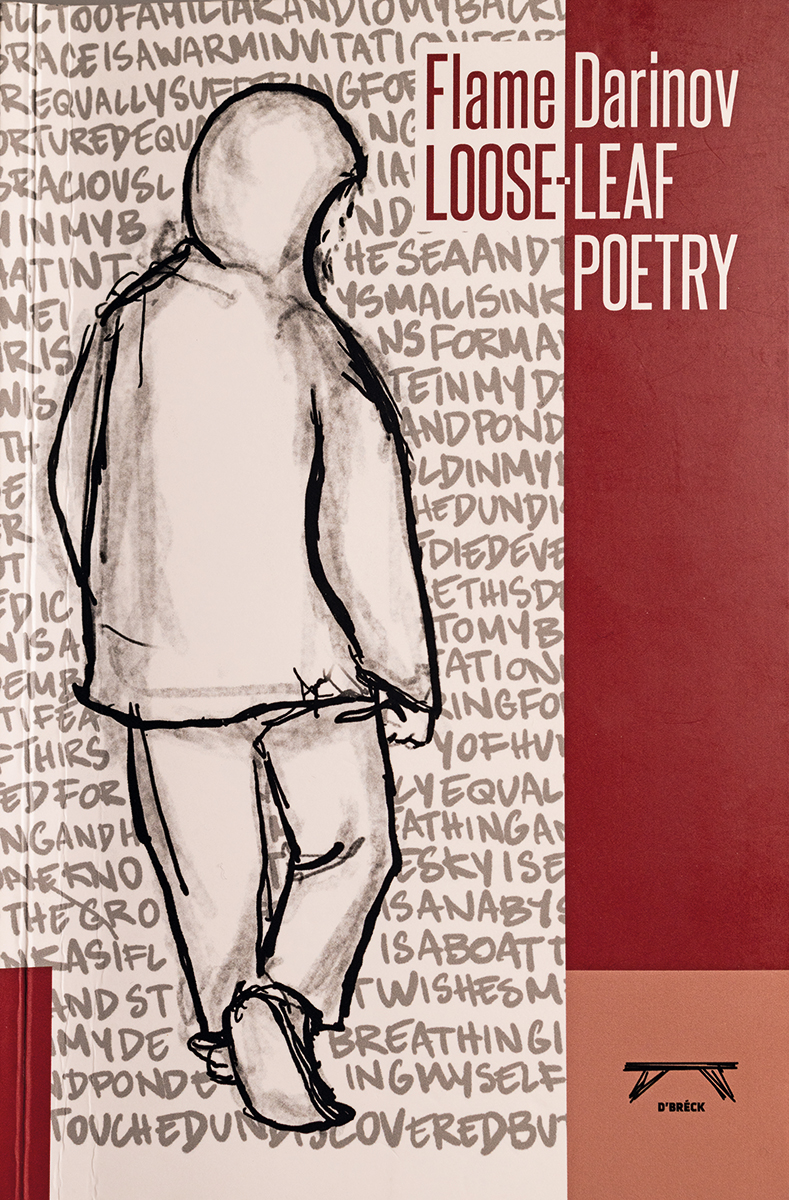Loose-Leaf Poetry, Flame Darinov’s first collection of poems, is, according to the author, a “collection of things [he] picked up from Sofia to Luxembourg, from home to abroad.”1 Right upon opening the booklet, the reader catches sight of a variant of the title in the Cyrillic alphabet. A juxtaposing arrangement of Luxembourgish-Bulgarian is applied to all five chapters, conveying the impression of the author looking back on his past self. This parallelism between present and past in addition to the many self-negating titles (Mäi groussen oeuvre gesäit kleng aus; Korrektioun an aner Feeler) already foreshadows the upcoming inner (and outer) conflict of the protagonist.
Loose-Leaf Poetry seems to be a very fitting name for this collection of poems which appear to be a carefully plucked selection of individually written pieces that, although contradicting each other more than once, make up a harmonious whole of differently colored and nuanced elements. These loose leaves are everywhere and nowhere, in the present and in the past, here and there. They are detached from their root, scattered, alienated, searching… Just like the protagonist. “I come and go nowhere:/ This desert unknown is all too familiar”:the poet makes it unmistakably clear that his protagonist suffers from a painful wanderlust, a yearning for faraway places, a “thirst for elsewhere”. His “fire longs for a home/ Which is not [his] motherland”, so he becomes a Wanderer, incessantly, but not always tirelessly, searching for something new, for the unknown, for another version of himself.

Darinov’s creative wordplay with multilingual elements visualizes the protagonist’s venture into the world: in the poem Frühstück, the author humorously illustrates his reflections upon learning this new word which reminds him of “fish dish”. Also, in Everyone wants to change this poem (“Geet et? Geet et? A wou geet et?”), a light-hearted, almost child-like playfulness shines through and stands in stark contrast to the deeper and darker poems of the collection. Next to inventing new words (Mehrfaarbenhaar), his style also stands out through unusual rhymes: “His browned heard of Zeitablauf/ With ginger tones on outer-mouth/ Glistened in the rays of the sun.” The more the reader moves along the verses, the more other languages are to be discovered („ragazzino al lago“, Vide-Coeur…), just innocently lurking, from time to time standing out in cursive. This happens almost unnoticeably, as it becomes clear that the protagonist is now part of a multilingual environment. But once away from home, freedom and relief go hand in hand with the creeping feelings of loneliness and melancholy and the initial longing for foreign land and adventure seems to find a new form in longing for love and a sense of belonging. Between discovering exciting danger in lust and love (Theft) and gradually losing pieces of past innocence, the protagonist learns what it means to grow up. Here, the poet beautifully displays the gloomier side of his writing (Romanticizing).
Homage-like, the writer dedicates verses to poetry’s past as well. With his poem Maximahias (“I once met a traveller in the deep night,/ Who said…”), Darinov follows the lyrical steps of Percy Bysshe Shelley’s Ozymandias. In the last poem of the collection, he alludes to William Blake’s The Tyger when he writes: “Water, water weaving life,/ With flow and stillness both so rife,/ What manmade hole or bed alike/ Can hold thy shapeless symmetrie?” Like an echo through time and space, the writer takes the reader on a journey through the realms of the beauty and complexities of poetry. The protagonist seems to have found water at last to quench his thirst, but “the water around [him] boils” (Spekulatioun). The fire inside of him, that extends to the outside, is not yet extinguished. I suppose this means we can expect to hear more from the author in the future? After all, he goes by the name of Flame…
Loose-Leaf Poetry shows the journey of a young person leaving home and finding his way in the world. Surely there is no lack of fear, but no lack of courage either. I believe many people can relate to this protagonist: to feeling stuck in a place they’ve never left, to leaving behind all that is familiar and how much courage it takes to face the unknown. But also, how rewarding the experience of overcoming your fears can be and how you, maybe even without noticing, might find many homes and parts of you in many places and people.
It’s only fitting that the publisher’s name is “D’Bréck” as there seems to exist an inherent idea of building bridges: not only between time and space, past and present, but between languages, cultures and nations as well and, in that way, overcoming not only physical barriers, but also psychological ones in the process.
NB
- http://tinyurl.com/loosleaf (visited last on the 20th December 2023)
Als partizipative Debattenzeitschrift und Diskussionsplattform, treten wir für den freien Zugang zu unseren Veröffentlichungen ein, sind jedoch als Verein ohne Gewinnzweck (ASBL) auf Unterstützung angewiesen.
Sie können uns auf direktem Wege eine kleine Spende über folgenden Code zukommen lassen, für größere Unterstützung, schauen Sie doch gerne in der passenden Rubrik vorbei. Wir freuen uns über Ihre Spende!
